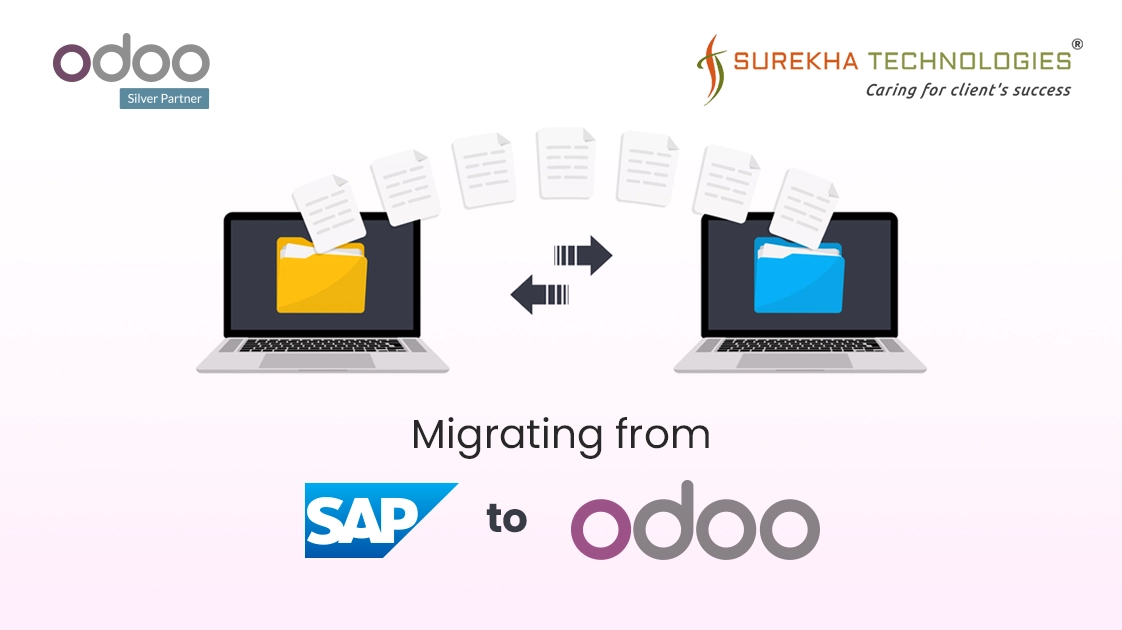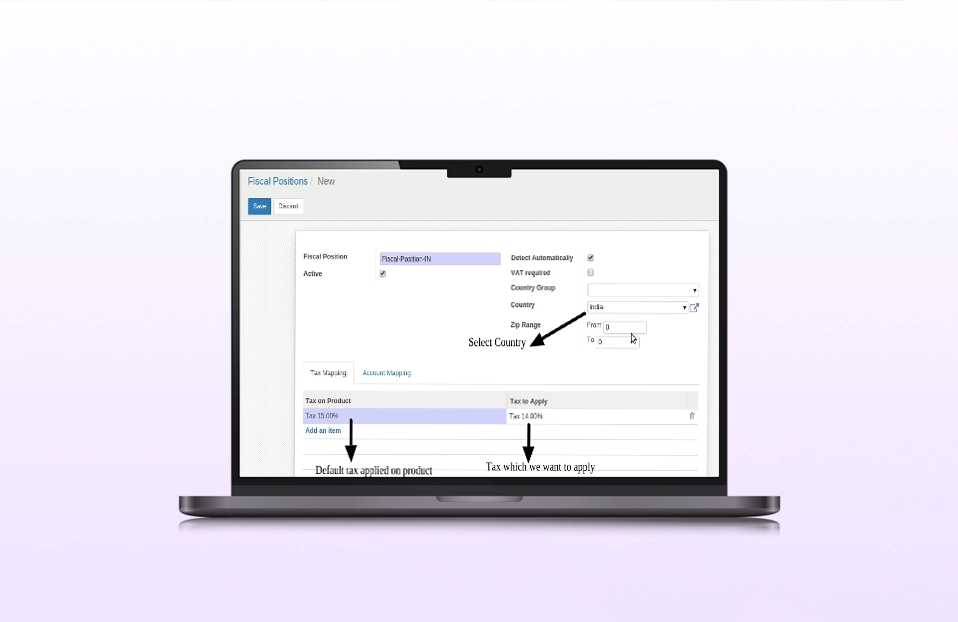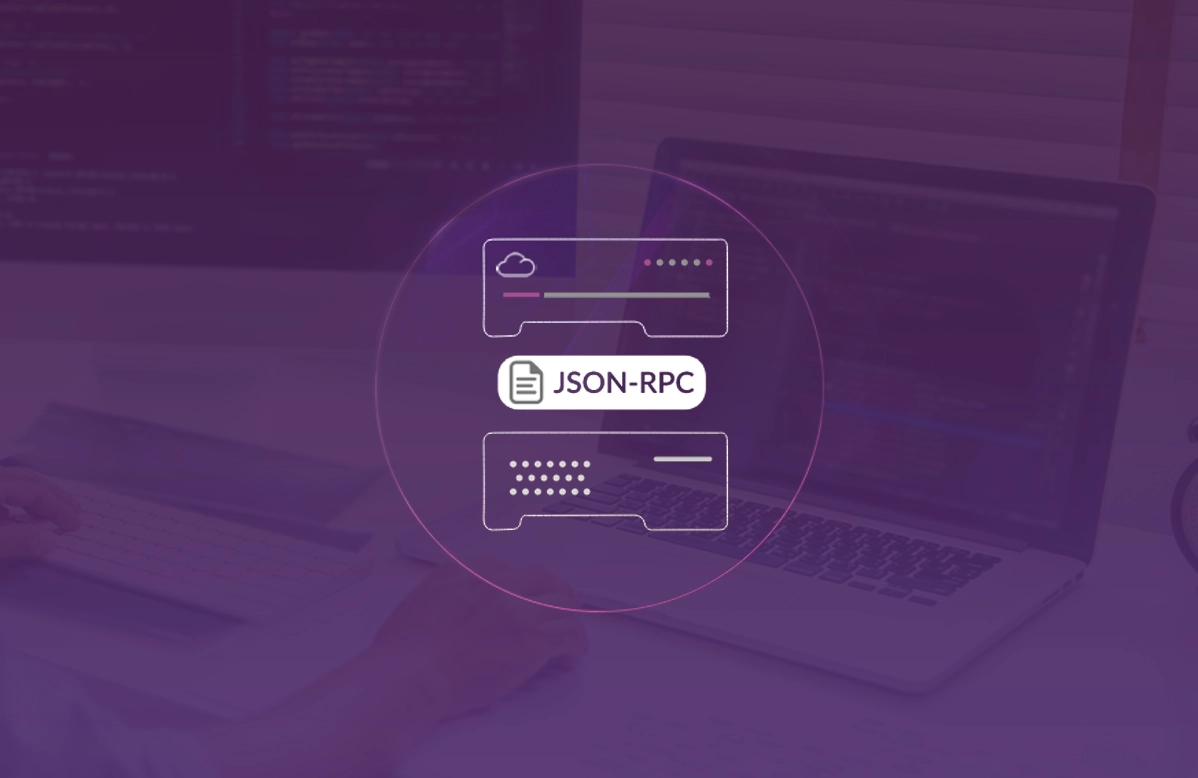The upcoming end of support phase for SAP ECC makes businesses think and consider a seamless migration. SAP ECC provides a stable platform that many organizations rely on, and it has been the foundation for integrating and managing vital business activities for many years. But now that SAP has shifted its attention to SAP S/4HANA, the next-generation ERP technology, ECC is in danger of becoming obsolete
This essential transition is directing companies to reevaluate their ERP strategies and consider alternative solutions including Odoo. As businesses struggle with this significant change, factors like security, compatibility, and future-proofing their operations become crucial.
In this article, we will investigate the implications of SAP ECC to Odoo migration, exploring the potential benefits and challenges associated with this migration.
The Future of SAP ECC
Enterprise resource planning in many firms has been based on SAP ECC. But SAP has stated that it will stop supporting ECC by 2027. These are the main drivers for their decision.
Replace SAP S/4HANA
SAP is focusing on its next-generation ERP suite, SAP S/4HANA. S/4HANA outperforms ECC in terms of performance and features due to its use of in-memory computing and powerful analytics.
Changing Technology Requirements
Scalable, integrated, and flexible solutions are essential for modern enterprises. Real-time data processing, enhanced user interface, and simple connection with other SAP products and external apps are some of the ways that SAP S/4HANA meets these needs.
Allocation of Resources
It is not feasible for SAP to maintain two distinct ERP systems. SAP can devote more resources to research and development by focusing on SAP S/4HANA, which will enable them to provide their clients with better tools and support.
Market Influence
The business world is getting harder and harder. To stay competitive, businesses require the newest technologies. SAP S/4HANA facilitates this process for enterprises by providing advanced features that ECC is unable to match.
Businesses using SAP ECC must prepare their transition as the end-of-support date draws near to avoid problems and take advantage of the new opportunities provided by SAP S/4HANA or other ERP solutions.
Which Is the Right Time for Migration?
It takes careful planning and scheduling to Migrate from SAP to Odoo ERP, or an alternative. While choosing when to switch, consider the following things.
Every company must choose whether it is prepared to assume the risks associated with postponing the change. Planning of time guarantees that there will be enough time for testing, data migration, user training, and system evaluation.
Additionally, it enables businesses to benefit earlier from contemporary ERP systems. It comes with better operational efficiency, real-time reporting, and greater analytical capabilities.
Businesses can manage risks, maximize resources, and match their ERP strategy with long-term business objectives by carefully controlling the transition timetable. This strategy reduces obstacles reduced, and the organization is set up for future expansion and innovation.
The Risks of Delaying SAP Migration
Delaying the SAP migration ECC brings with it several dangers that companies need to properly weigh. Among these dangers are:
Risks to Security
Delaying the switch from SAP ECC to Odoo will put your security at serious risk. The program won't get upgrades or fixes to fix new security flaws after SAP terminates support for it. Without the requisite defenses or regulatory updates to safeguard sensitive data and uphold legal compliance, this exposes systems to possible cyber threats and compliance problems.
Incompatibility
If the move away from SAP ECC is delayed, there may be incompatibilities with recent apps and technologies. Businesses may need help to incorporate ECC's outdated infrastructure as they develop and use advanced software solutions. Operational inefficiencies, siloed data systems, and difficulties sustaining successful cross-platform communication might arise from this.
Support Restrictions
Businesses experience limitations in acquiring technical help and upgrades when SAP discontinues support for ECC. Fixing problems and keeping the system functioning becomes difficult and expensive without SAP's assistance. This lack of support may also make it difficult to install updates or new features, which would lower the ERP system's overall effectiveness and performance.
Lost Business Opportunities
There may be lost opportunities for corporate expansion and innovation if the switch from SAP ECC is delayed. Businesses may find it difficult to implement new technology and business models that could improve their competitiveness if they continue to use old systems. Organizations will be unable to take advantage of the analytics, real-time reporting, and effective procedures found in contemporary ERP systems due to this upgrade delay.
Extended Migration Periods
Postponing the switch from SAP ECC increases the amount of time needed to upgrade to SAP S/4HANA or migrate to a new ERP system. In addition to raising expenses, this delay wastes resources that could be used for other important projects. Additionally, it delays the advantages of contemporary ERP systems, including increased operational effectiveness, better data management, and stronger decision-making powers. Every one of these elements demonstrates the need for prompt action. It emphasizes the necessity of converting to contemporary ERP systems or their equivalents, which aid in risk management and open new business options.
What are the Options when SAP Closes ECC?
Once SAP stops supporting ECC, there are a few options for enterprises to continue operating efficiently:
Maintain
The choice to use ECC after support expires may still be made by some companies. Restricted integration and security issues will become risks for companies choosing this option.
Update
Businesses can benefit from the capabilities like real-time analytics and streamlined procedures by migrating to SAP S/4HANA. This update can boost productivity and offer a foundation for expansion in the future.
Support Restrictions
Businesses experience limitations in acquiring technical help and upgrades when SAP discontinues support for ECC. Fixing problems and keeping the system functioning becomes difficult and expensive without SAP's assistance. This limitation of support can also make it difficult to install updates or new features, which would lower the ERP system's overall effectiveness and performance.
Migrate
It is migrating to alternate Like Odoo ERP solutions an open-source platform that provides affordability and flexibility. Odoo supports multiple industries with its flexible approach and offers customizable solutions tailored to specific business needs.
Businesses can choose and include just the applications they require because of Odoo's flexible structure. It minimizes expenses and lowers complexity. Furthermore, the open-source nature of Odoo fosters community support and innovation. This guarantees regular upgrades and enhancements.
Migrate To Odoo
As an alternative to SAP S/4HANA, Odoo is affordable, highly configurable, and consistently supported. It offers scalability, flexibility, and adaptability to changing business requirements, making it a strong choice for organizations seeking efficiency and creativity.
Odoo provides an extensive range of business apps, including accounting, CRM, inventory management, and more. These apps are simple to use and provide integrated solutions that boost performance and simplify processes.
It is important to know the costs, difficulty of implementation, and organizational readiness of each option. It varies with each organization to decide what is the best course of action because they all have different demands and strategic objectives. Businesses can successfully manage the transition and position themselves for long-term success by strategically planning time and doing assessment of the opportunities. Odoo Migration can help you upgrade your Odoo to the Next version.
What Makes Odoo Better Than SAP S/4HANA?
The decision between SAP S/4HANA and Odoo is important when choosing an ERP system. Odoo has several clear benefits. Let's examine why Odoo can be the best option for companies looking for a flexible and effective ERP system.
Open-Source Platform
Odoo is an open-source platform specifically designed for business management that provides many integrated applications to facilitate different business operations. It offers solutions within a single ecosystem for areas including sales, CRM, project management, inventory, accounting, human resources, and more.
Cost Effective
When it comes to cost-effectiveness, Odoo is preferred over SAP S/4HANA. Due to its cost-effective implementation and maintenance costs, it is affordable for businesses with limited resources. This affordability allows businesses to deploy resources freely and invest in expansions or other strategic areas. However, its features and integration capabilities, SAP S/4HANA often require a big investment, making it appropriate for larger businesses with demanding operational requirements.
Multiple Versions
Odoo has multiple versions tailored to diverse business sizes and sectors. Due to this flexibility, businesses can select the version that closely matches their unique requirements, guaranteeing that they receive the relevant features and functionalities. Businesses that are small to medium-sized can begin with the basic edition and upgrade as they expand. On the other hand, SAP S/4HANA offers a uniform methodology. This could be less flexible to meet the needs of smaller businesses or specialized sectors.
Exceptionally customizable
Odoo is easily configurable, therefore companies don't need to spend a lot of money on development to adapt the ERP system to their own workflows and needs. To meet their unique demands, users can integrate third-party apps, create new capabilities, and alter modules. Businesses can optimize their operations and keep a competitive edge with this level of personalization. However, even though SAP S/4HANA has functionality, smaller companies with fewer resources will find it difficult to use due to the need for involved and expensive customization procedures.
Adaptable
Businesses can begin with basic modules from Odoo and add more features as their needs change thanks to its modular architecture. Scalability and cost-effectiveness are guaranteed by this flexibility, which allows businesses to gradually grow their ERP system without incurring large upfront expenses. Companies can select just the modules they require, cutting down on complexity and unnecessary functionality. SAP S/4HANA, on the other hand, has many integrated modules, but they can be fixed and need a big initial investment, which may make it less adaptable for companies that want to grow over time.
Improved Speed
Odoo development is renowned for its quick processing rates, which improve both operational effectiveness and user experience. Due to its lightweight architecture, jobs are finished fast, reducing downtime and boosting output. Due to their need for a responsive system to keep up with everyday activities, small and medium-sized organizations particularly benefit from this performance advantage. SAP S/4HANA, on the other hand, is resource-intensive and, although powerful, can cause poorer performance in some contexts, particularly if improperly optimized.
Ongoing Assistance
Odoo ensures that businesses keep current with the newest features and security patches by offering constant support and updates. This continuous assistance lowers the risk of downtime and security risks while assisting enterprises in maintaining system performance and dependability. Frequent updates guarantee that the ERP system adapts to changing business requirements and advances in technology. On the other hand, SAP S/4HANA provides robust support, but managing it can be difficult for smaller organizations due to its higher maintenance costs and complex upgrade processes.
Odoo for Support
Odoo offers a global network of accredited partners who provide region-specific expertise and support. These partners ensure that businesses maximize the value of their ERP systems by assisting with implementation, customization, and ongoing maintenance. Collaborating with an official partner for Odoo migration services streamlines the implementation process and deliver tailored solutions to meet specific business needs. In contrast, while SAP S/4HANA also has a partner network, smaller businesses may find it challenging to access these services due to the system's complexity and scale, often requiring specialized and costly consulting.
Future Adaptable Technology
Odoo is based on an advanced technological stack that can swiftly adjust to new developments and modifications. Due to its open-source creation, the program can be enhanced and improved by the community, keeping it current with the newest standards and trends. Odoo development solution is future proof for companies trying to maintain their competitiveness. SAP S/4HANA, on the other hand, uses advanced technologies as well, but its updates and enhancements are sometimes less regular and rigid, which may make it difficult for companies to keep up with the quick pace of technology development.
Read more about Odoo v/s SAP to understand the difference and significance.
Real Life Example of Migrating from SAP to Odoo
After using SAP proprietary software, FGY sought a more flexible open-source solution and chose Odoo. The Odoo implementation helped them with tailored plans and successfully migrated from SAP Business One to Odoo within months, implementing systems for accounting, sales, CRM, inventory management, shipping, purchasing, and geospatial sales analysis.
Ref.- https://www.odoo.com/blog/customer-reviews-6/fyg-abandons-sap-for-odoo-s-flexibility-growth-opportunities-310
Conclusion
Businesses need to redefine and rethink to modernize their ERP systems as SAP ECC will be an end at the support phase. Delaying this change can put your business at risk for operational inefficiencies, security flaws, and lost opportunities of expansion. Odoo distinguishes itself as a strong substitute by providing not just affordability and adaptability but also ongoing support and flexibility to meet changing business requirements.



